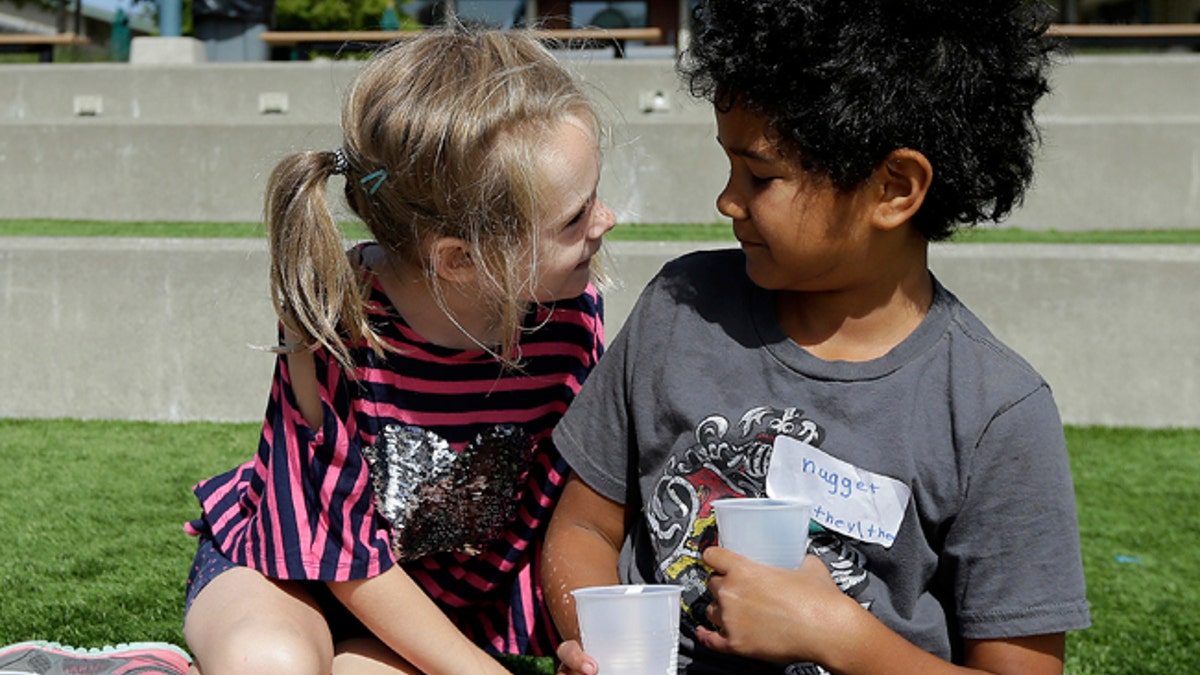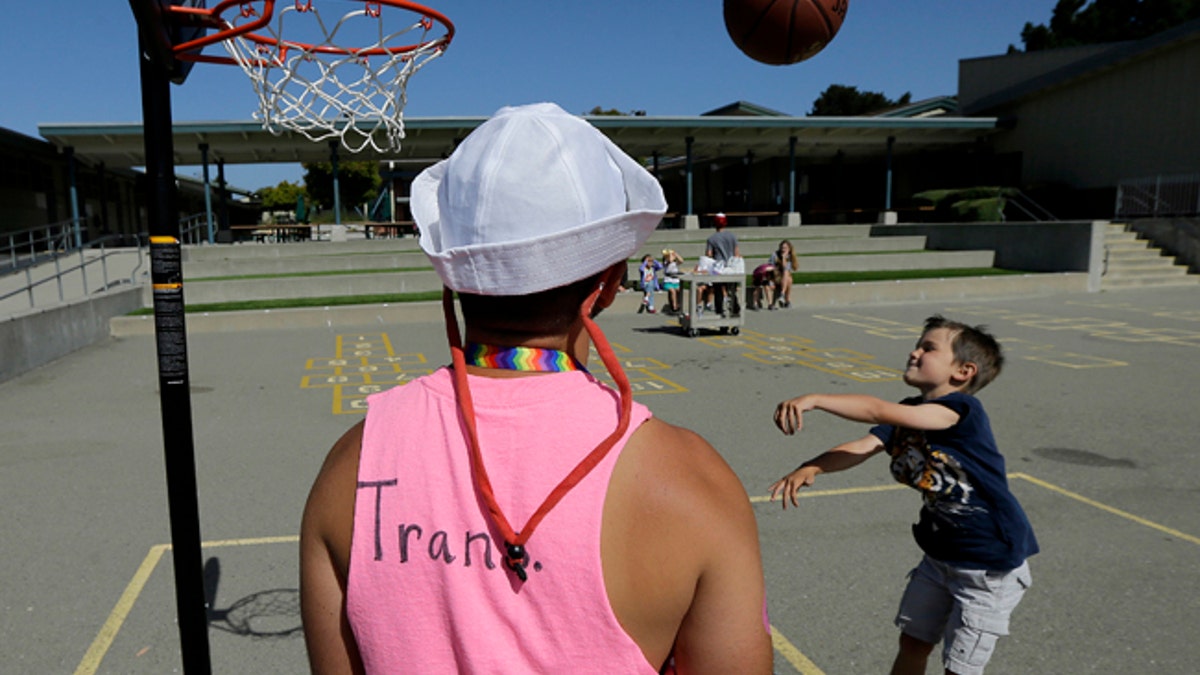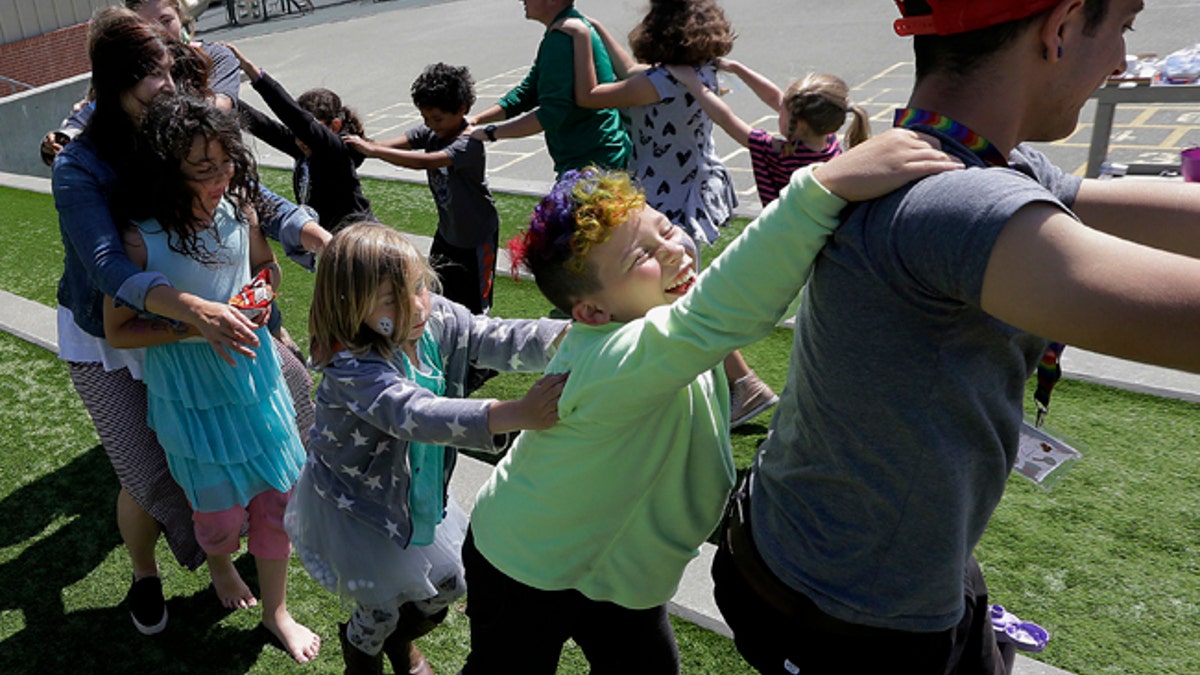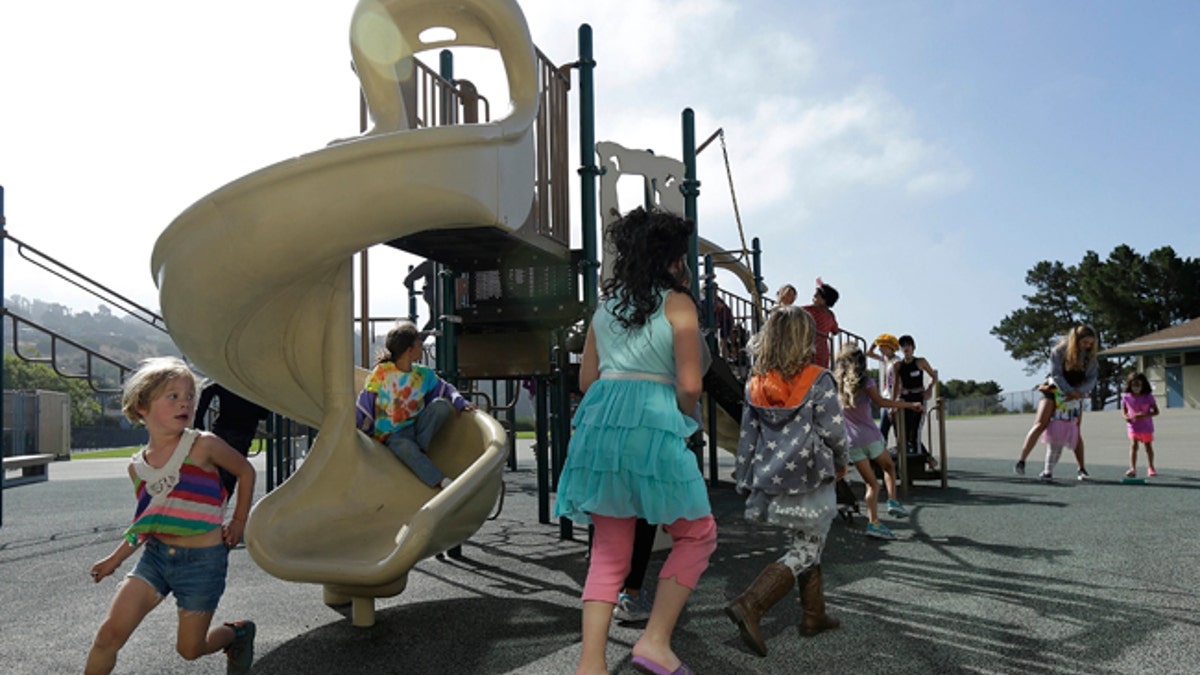
Campers Gracie, left, leans toward Nugget during an activity at the Bay Area Rainbow Day Camp in El Cerrito, Calif., in this July 11, 2017 photo. (AP)
A summer camp for transgender and “gender fluid” children is taking in children as young as 4.
The camp seems like any other. Children arrive with a packed lunch, make friendship bracelets, sing songs and get silly. But each day at check-in, campers make a nametag with their pronoun of choice. Some opt for “she” or “he” while others choose “they” or something else.
And enrollment at the camp is booming. The number of children at the San Francisco Bay area camp has tripled to about 60 youngsters, from age 4 to 12, since it opened three summers ago, with kids coming from as far away as Los Angeles, Washington, D.C. and even Africa. There is talk of opening branches of the camp across the country.
Experts say there are few camps like it.
On a sunny July morning at camp, the theme was "Crazy Hair Day," and 6-year-old Gracie Maxwell was dancing in the sunshine as a Miley Cyrus song blasted from outdoor speakers. The freckled, blue-eyed blonde wore her hair in a braid on one side, a pigtail on the other and snacked on cereal as she twirled and skipped.
"Once she could talk, I don't remember a time when she didn't say, 'I'm a girl,'" said her mother, Molly Maxwell, who still trips over pronouns but tries to stick to "she."
"Then it grew in intensity: 'I'm a sister. I'm a daughter. I'm a princess,'" Maxwell said. "We would argue with her. She was confused. We were confused."
RELATED STORIES
Living in the liberal-minded Bay Area made it easier. The Maxwells found a transgender play group, sought specialists, and at 4 years old, let Gracie grow her hair, dress as a girl and eventually change her name.
"I see her now, compared to before. I watch her strut around and dance and sing and the way she talks about herself. If she was forced to be someone else," the mother trails off, "I don't even want to think about that."
Gender specialists say the camp's growth reflects what they are seeing in gender clinics nationwide: increasing numbers of children coming out as transgender at young ages. They credit the rise to greater openness and awareness of LGBT issues and parents tuning in earlier when a child shows signs of gender dysphoria, or distress about their gender.

Camp instructor Kris Gambardella watches as camper Wilson shoots baskets at Rainbow Day Camp. (AP)
Nevertheless, even as the number of children going to gender clinics has increased, not everyone agrees that these types of medical treatments are safe for children.
An article by three medical experts published in June called "Growing Pains: Problems with Puberty Suppression in Treating Gender Dysphoria" calls into question some underlying assumptions on this topic.
In their article, the authors write that transgender-affirming treatments of children “may drive some children to persist in identifying as transgender when they might otherwise have, as they grow older, found their gender to be aligned with their sex.”
These experts are concerned about the possibility that “the interference with normal pubertal development will influence the gender identity of the child by reducing the prospects for developing a gender identity corresponding to his or her biological sex.”
Still, camp founder Sandra Collins says at some point, Rainbow Day Camp won't be seen as innovative. Collins' experience as the mother of a transgender girl, now 9, inspired her to start the camp, and another for 13- to 17-year-olds called Camp Kickin' It.
"A lot of these kids have been bullied and had trauma at school. This is a world where none of that exists, and they're in the majority," Collins said. "That's a new experience for kids who are used to hiding and feeling small."
There is little comprehensive data on young children who identify as transgender, but experts say as the number of young people coming to their clinics increases, the prevailing medical guidance has shifted.

Campers and camp counselors dance at Rainbow Day Camp. (AP)
The favored protocol today is known as the "gender affirmative" approach, which focuses on identifying and helping transgender children to "socially transition" - to live as the gender they identify with rather than the one they were born with until they're old enough to decide on medical options like puberty blockers and later, hormone treatments.
The Center for Transyouth Health and Development at Children's Hospital in Los Angeles, started a decade ago with about 40 patients. Now it has over 900 people, ages 3 to 25, enrolled in its program, with 150 on its waiting list, said Johanna Olson-Kennedy, the clinic's medical director.
"I just think there's a lot more openness to the understanding that trans adults start as trans kids," Olson-Kennedy said. "When people say, 'Isn't this too young?' my question back to them is, 'Too young for what? How young do people know their gender?' The answer to that is some people know it at 3, and some people know it at 30."
Diane Ehrensaft, director of mental health at the University of California, San Francisco's Child and Adolescent Gender Center, says enrollment there has tripled over the past few years with a "sea change” in the number of little kids showing up with their families.

Children play at Rainbow Day Camp. Organizers say the camp gives kids a fun, safe space to be themselves. (AP)
Studies show transgender adults have higher rates of suicide and depression than the general population. A 2016 study by the University of Washington's TransYouth Project, published in the journal Pediatrics, found trans children who live as their preferred gender and are supported by their parents have the same mental health outcomes as other kids their age.
At Rainbow Day Camp, a therapist is on hand to talk to children. Therapy sessions are extended to parents at a support group after morning drop-off. Many counselors are transgender.
"I want to show these kids what a confident, happy, successful trans person looks like," said camp director Andrew Kramer, 30, who goes by AK and came out as a transgender man at 26. "We teach them they are normal, deserving of love, and not alone."
One family traveled from Africa to enroll their son in the camp for its full three-week summer session. The 9-year-old goes by the name Nao at Rainbow but has not publicly come out as a transgender girl. The family asked that their last name and the country where they live be kept confidential, fearing repercussions there.
Nao's mother, Miriam, said she watched her child blossom at camp. Nao was happier and less prone to outbursts, made friends, opened up about school bullying, and wants to return next summer.
"I think for the first time, (Nao) feels like just a normal kid," Miriam said.
Before flying home, she said, Nao wrote a note to the camp's counselors. It read: "Thank you, for making me feel so happy."
The Associated Press contributed to this report.

